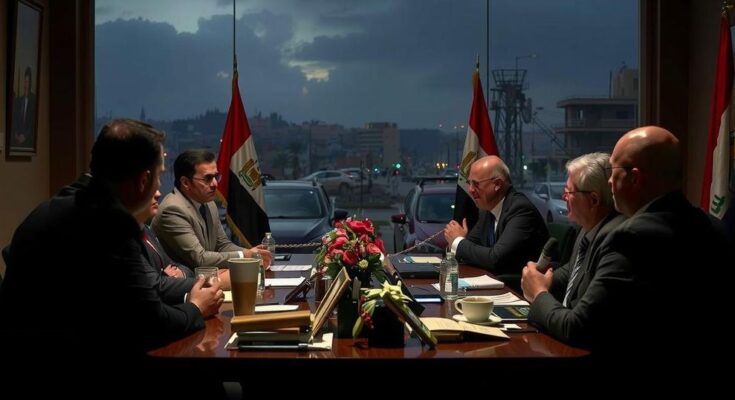Egypt’s President Abdel Fattah al-Sisi has proposed a two-day ceasefire to negotiate the exchange of four Israeli hostages for Palestinian prisoners amidst ongoing conflict in Gaza. The humanitarian crisis worsens as Israeli strikes continue, causing thousands of casualties. Efforts for a long-term resolution involve multiple international mediators, but fundamental disagreements between Israel and Hamas persist.
In a recent development, Egyptian President Abdel Fattah al-Sisi announced a proposal for an initial two-day truce in Gaza aimed at facilitating the exchange of four Israeli hostages held by Hamas for a number of Palestinian prisoners. This announcement comes amid escalated Israeli military actions that resulted in the deaths of 45 Palestinians across the Gaza Strip. The proposal was made during a press conference in Cairo, held alongside Algerian President Abdelmadjid Tebboune, where President Sisi emphasized the need for negotiations to recommence within ten days following the truce to pursue a more permanent resolution. The ongoing conflict, which has lasted more than a year, has drawn in key mediators, including officials from the United States, Qatar, and Egypt, as well as intelligence leaders from the CIA and Israel’s Mossad. An unofficial source involved in the negotiations stated that Hamas is likely to consider the new proposals but remains insistent that any ceasefire must lead to the withdrawal of Israeli forces from Gaza. In contrast, Israel maintains that the conflict cannot be resolved until Hamas is completely incapacitated as both a military faction and governing power in the region. The humanitarian situation in Gaza has reached critical levels, with Gaza health officials reporting that the death toll from Israeli airstrikes has approached 43,000, amidst claims of severe shortages of food, medicine, and basic supplies. The United Nations has condemned the humanitarian crisis, citing “unbearable” conditions for civilians, particularly in northern Gaza. The Secretary-General of the United Nations, Antonio Guterres, expressed shock at the scale of devastation, highlighting that many civilians are caught in the crossfire without access to essential health care, food, or shelter. Despite declaring adherence to international law, Israeli authorities have been accused of hindering humanitarian aid delivery, while Israel argues that its operations specifically target Hamas fighters who supposedly exploit civilian areas as shields. Israeli military operations have predominantly concentrated on northern Gaza, where they claim progress has been made against militant activities. Recent airstrikes resulted in deaths among displaced persons seeking refuge in shelters, including an attack on a school in the Shati refugee camp that killed at least nine individuals.
The context surrounding the conflict in Gaza arose from a violent escalation initiated by Hamas’ incursion into southern Israel on October 7 of the previous year, resulting in significant casualties on both sides. The ensuing Israeli military response has resulted in widespread devastation in Gaza, leading to a humanitarian crisis marked by high civilian casualties and acute shortages of essential supplies. The role of Egypt, along with other regional actors, is pivotal in mediating efforts aimed at establishing a ceasefire and facilitating prisoner exchanges that may serve as precursors to longer-term peace negotiations.
In conclusion, the proposal for a two-day truce by Egypt reflects ongoing diplomatic efforts to mitigate the humanitarian crisis in Gaza amidst a backdrop of mounting casualties and extensive destruction. The complexities of the conflict are underscored by differing objectives of the involved parties, with a focus on hostage exchanges amid calls for a more sustainable peace process. The international community continues to call for urgent resolutions to alleviate the suffering of civilians trapped in the conflict, as negotiations remain fraught with challenges.
Original Source: gazette.com




